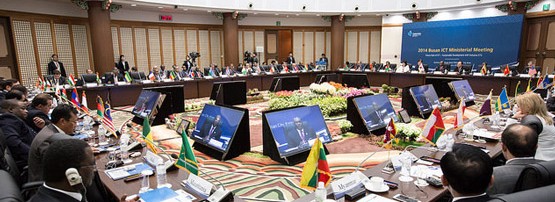
In late August, I blogged about the final Asia Pacific Telecommunity (APT) preparatory meeting for PP-14, the quadrennial global conference of the International Telecommunications Union (ITU).
The Plenipotenitary (usually referred to as Plenipot) is the main decision-making meeting of the ITU. Held every four years, it sets the strategic direction and financial plans for the Union. It is also the venue for the election of the senior management team and the Member States that will form the Council.
It is a large complex meeting with some 3,000 people expected to converge on the Bexco Convention Centre in Busan, Republic of Korea, between 20 October and 7 November.
Hundreds of proposals will be considered, negotiated, and agreed to cover a broad spectrum of topics from the treaty-level Constitution and Convention, to proposals focused on the organization’s HR and document access policies.
APNIC is a D-Sector Member of the ITU, which affords us observer status at the meeting between Member States. At this point in time it is unclear whether APNIC (and other non-governmental representatives at the meeting) will be permitted to participate in the decision-making processes, but by observing and working directly with Member States’ delegations, we hope to help them understand how decisions made might affect the Internet ecosystem.
The ITU membership continues to take an interest in the Internet and while some delegates will be considering ITU budgetary and operational issues, others will focus on outcomes that might give governments more control and influence over network operators, software developers, and other Internet service provider companies.
However, there is also an interesting series of proposals to be discussed, which focus on how the ITU works with other organizations and individuals and some that deal with the transparency and availability of ITU documents.
During the divisive World Conference on International Telecommunications (WCIT) 2012, stakeholders raised concerns that documents proposing changes that would directly affect the operation of the Internet were not made available. This led to the establishing of a dedicated site WCIT Leaks (no relation to Wikileaks). As a result more governments are asking for the ITU to be a more transparent and inclusive organization, similar to many other United Nations agencies.
There are several proposals directly related to Internet operations and IP addressing, including those unsuccessful ideas that created the controversy at WCIT. Other new discussions focus on the need to clarify the ITU’s own role in multistakeholder Internet governance. Certainly, discussions during the APT preparatory process ranged as far as to discuss the role the Government Advisory Committee (GAC) plays at ICANN.
Changes to existing ITU Resolutions on the Internet, IP addressing, transit, peering, and more will be under discussion over the next three weeks.
After participating in the regional preparatory process for this world conference, I am now attending the PP-14 and will report on any issues that may affect APNIC Members and stakeholders.
The views expressed by the authors of this blog are their own and do not necessarily reflect the views of APNIC. Please note a Code of Conduct applies to this blog.
